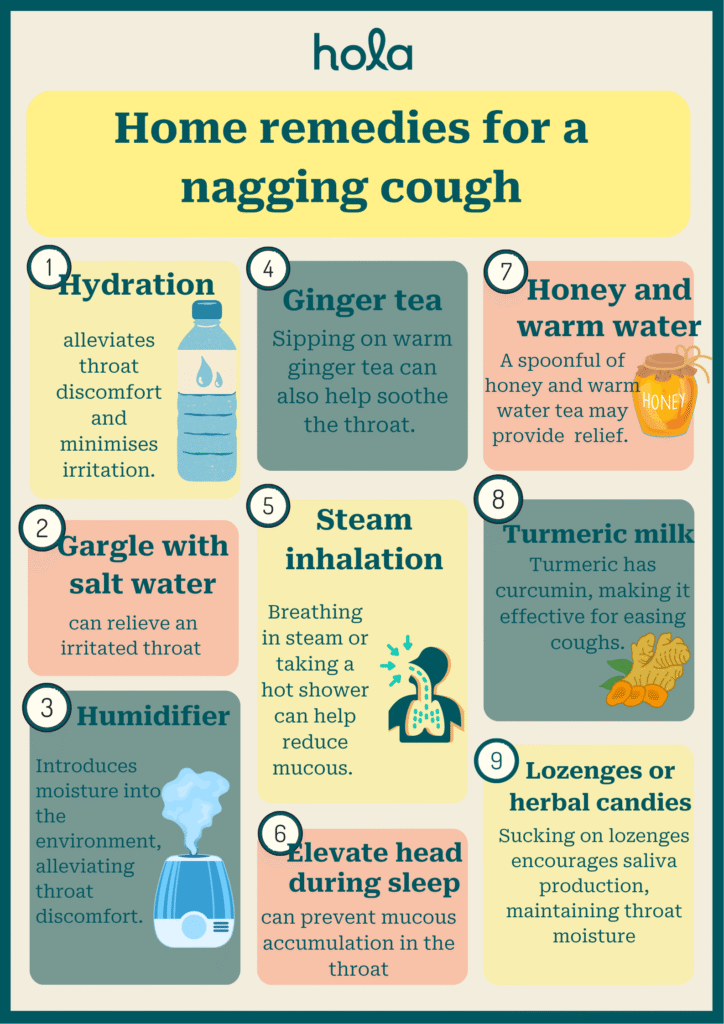Reasons why your cough may not be improving
Written by the editorial staff writer at Hola. Medically Reviewed by Dr. Ammar AL-ANI, MBChB, CCBST, AMC.

Contents

Summary: A chronic cough can result from various factors, including infections, allergies, acid reflux, or chronic conditions like asthma. This guide covers the diagnosis, treatment options, and indicators of when to seek medical help. It also explores telehealth consultations, key questions to ask a doctor, and effective home remedies for relief and symptom management.
A persistent cough can be frustrating, almost like an annoying alarm that won’t stop. While coughing usually indicates your body is clearing something out, a cough that persists for weeks could signal a deeper issue. From ongoing infections to chronic conditions, there are many reasons for a prolonged cough. Let’s explore the possible causes and uncover why it’s lingering.
Causes for a nagging cough
A nagging cough can have several causes, ranging from mild to more serious conditions. Here are some common reasons:- Respiratory infections: The common cold or influenza can result in a persistent cough that lingers after other symptoms have resolved. Bronchitis, the inflammation of the bronchial tubes, frequently leads to a lasting cough. Pneumonia, an infection in the lungs caused by bacteria or viruses, can also contribute to a chronic, productive cough.
- Postnasal drip (upper airway cough syndrome): A buildup of excess mucus from sinus infections, colds, or allergies can trickle down the throat, leading to irritation and coughing.
- Asthma: This ongoing condition causes the airways to become inflamed and constricted, resulting in a cough that worsens at night or in response to triggers such as dust, cold air, or physical activity.
- Acid reflux (GORD - gastroesophageal reflux disease): When stomach acid backs up into the oesophagus, it can irritate the throat, leading to a chronic cough that is particularly noticeable at night or following meals.
- Smoking or exposure to irritants: Smoking harms the lungs and is associated with a persistent "smoker’s cough." Other irritants like air pollution, dust, strong fragrances, and chemicals can also provoke coughing.
- Medication side effects: Certain medications, particularly ACE inhibitors, may result in a chronic dry cough as a side effect.
- Whooping cough (pertussis): This bacterial illness is characterised by severe coughing episodes, often followed by a distinctive "whooping" sound during inhalation.
- Tuberculosis (TB): A serious bacterial infection, tuberculosis may result in a continuous cough, often accompanied by mucus or blood.
- Lung conditions (COPD, pulmonary fibrosis, or cancer): Chronic obstructive pulmonary disease (COPD), which includes conditions like emphysema and chronic bronchitis, can lead to a long-lasting cough. Lung cancer may also be associated with a persistent cough that sometimes produces blood-tinged mucus.
- Psychological or habitual causes: Some individuals may develop a chronic cough without any identifiable medical cause, frequently triggered by stress or anxiety. This is referred to as a habit cough.
Also read: Chronic cough: GP-approved management tips
Feeling sick and unsure why? Speak with a GP online in 15 minutes.
Diagnosis
Diagnosing a nagging cough involves identifying its underlying cause through medical evaluation. A doctor may use a combination of history-taking, physical examination, and diagnostic tests to determine the reason for persistent coughing:- Medical history and symptom assessment: A doctor will inquire about the duration, triggers, and characteristics of the cough, as well as any accompanying symptoms, such as fever, mucus production, or wheezing. The patient's history of smoking, allergies, acid reflux, or medication use will also be evaluated.
- Physical examination: A comprehensive examination of the throat, lungs, and chest will assist in identifying potential infections, inflammation, or structural problems. The doctor may listen for wheezing, crackling sounds, or unusual breathing patterns.
- Imaging tests: A chest X-ray or CT scan can help identify pneumonia, lung infections, chronic lung diseases like COPD, or tumours. A sinus X-ray or CT scan may be used to diagnose chronic sinus infections responsible for postnasal drip.
- Pulmonary function tests: Spirometry and additional lung function tests assess airflow and diagnose conditions such as asthma or COPD.
- Allergy tests: Skin or blood tests might be performed to detect allergic triggers that contribute to postnasal drip or coughing related to asthma.
- Acid reflux tests: A pH monitoring test or endoscopy could be conducted to evaluate for gastroesophageal reflux disease (GORD) as a cause of chronic cough.
- Sputum and lab tests: A sample of mucus may be analysed for bacterial infections such as tuberculosis or pneumonia. Blood tests can also aid in identifying infections, immune disorders, or other underlying issues.
- Bronchoscopy: If other diagnostic tests yield inconclusive results, a bronchoscopy may be performed to examine the airways and collect tissue samples for further evaluation.
Also read: Types of dry cough and their potential causes
Home remedies to try
Home remedies can help soothe a nagging cough by reducing throat irritation, loosening mucus, and keeping airways hydrated. Some options are:
- Honey and warm water/tea: Honey possesses natural antibacterial and soothing qualities that assist in alleviating coughing and calming throat irritation.
- Ginger tea: Ginger contains anti-inflammatory compounds that help relax airway muscles and lessen cough severity. Sipping on warm ginger tea can also help soothe the throat.
- Steam inhalation: Breathing in steam helps clear mucus and hydrate dry airways. Adding essential oils like eucalyptus or peppermint can enhance the relief effect.
- Saltwater gargle: Gargling with warm salt water reduces throat inflammation, eliminates bacteria, and loosens mucus. This remedy is particularly beneficial for coughs resulting from infections or postnasal drip.
- Turmeric milk: Turmeric has curcumin, known for its anti-inflammatory, antiviral, and antibacterial properties, making it effective for easing coughs.
- Hydration: Consuming plenty of fluids, including warm water, herbal teas, and soups, aids in thinning mucus and keeping the throat moist, which helps prevent irritation.
- Humidifier use: Dry air can exacerbate a cough, so utilising a humidifier infuses moisture into the air, minimising throat irritation and congestion.
- Lozenges or herbal candies: Sucking on lozenges encourages saliva production, maintaining throat moisture and curbing the urge to cough.
- Sleeping position adjustment: Elevating your head while sleeping helps prevent postnasal drip and diminishes acid reflux, both common triggers for chronic coughs.

When to call the doctor
You should consult a doctor if a persistent cough continues for over three weeks, worsens, or is paired with symptoms like fever, shortness of breath, chest pain, or unexplained weight loss. Get immediate medical attention if you cough up blood, experience a high fever, or face wheezing or trouble breathing. A doctor's assessment is also needed if the cough is severe at night, disrupts sleep, or is related to asthma, acid reflux, or allergies. If you are taking ACE inhibitors (a type of blood pressure medications) and develop a continuous dry cough, speak with your doctor about possible alternative options. Prompt medical attention can aid in diagnosing serious issues like pneumonia, tuberculosis, or lung diseases and help prevent complications.
Telehealth with an online doctor for chronic cough
Telehealth services allow individuals to connect with healthcare providers regarding chronic cough symptoms from the comfort of their homes. Hola Health’s telehealth platform provides a convenient and dependable option for assessing and managing ongoing cough symptoms. Our services are available 24/7 and include:
- Telehealth consultations: Patients can interact with qualified doctors to discuss symptoms such as persistent cough, chest discomfort, wheezing, throat irritation, or mucus production. The online doctor will evaluate potential causes like allergies, asthma, GORD, or infections and offer expert advice on treatment and symptom management.
- Immediate scripts: If required, healthcare professionals can prescribe cough suppressants, inhalers, antihistamines, or acid reflux medications electronically. Prescriptions can be picked up from local pharmacies or delivered on the same day.
- Doctor referrals: For severe or unresolved situations, doctors can refer patients for further assessments, lung function tests, imageing (like chest X-rays), or consultations with specialists, such as pulmonologists or ENT experts.
- Medical certificate online: If a chronic cough impacts your work, school, or daily activities, Hola Health’s telehealth service can provide same-day or multi-day medical certificates as needed.
Questions to prepare for
Asking these questions will help you understand your condition and get the right treatment:
- What might be causing my chronic cough?
- Do I require any tests, like a chest X-ray or a lung function assessment?
- Is my cough possibly connected to allergies, asthma, acid reflux, or an infection?
- Are the medications I am currently taking contributing to my cough?
- What treatments or lifestyle modifications might help alleviate my cough?
- Will I need a prescription for cough suppressants, inhalers, or other medications?
- When should I consider seeking in-person care or consulting a specialist?
- How long should I wait to follow up if my cough does not improve?
A persistent cough could be your body’s way of saying, “Something’s wrong!” Whether it’s due to a lingering infection, allergies, or a more serious condition, identifying the cause is crucial for eliminating that cough. Don’t let it linger—get to the root of it and breathe freely again!
What we treat
- Cough
- Nausea & vomiting
- Fever
- Hayfever
- Fatigue
- Sore throat
- Acne
- Hair loss
- Gout
- Eczema
- Rosacea
- Sunburn
- UTI
- Erectile dysfunction
- Contraception
- Morning sickness
- Morning after pill
- Prostate health
- Anxiety
- Depression
- Stress
- Grief & loss
- Antidepressants
- Premature ejaculation
- Asthma
- Blood pressure
- Blood thinners
- Diabetes
- Cholesterol
- Migraines & headaches
- Allergies
- Body ache
- Heartburn & reflux
- Sleep disorder
- Pain relief
- Gastro
Related Articles
Disclaimer
This blog is for general informational purposes only and does not indicate that Hola Health provides all treatments or preventive measures mentioned. It is not intended to be a substitute for professional medical advice. Always seek the guidance of your doctor or other qualified health professional with any questions you may have regarding your health or a medical condition. For emergencies please immediately contact 000. Any medical topics discussed are intended to educate, not to imply availability through Hola Health.

Get affordable healthcare on your terms, with quick access to qualified, Australian-registered telehealth doctors & health practitioners, 24/7, 365 days a year. No more searching for ‘doctors near me‘ – Hola connects you instantly.
Address: 79 St Georges Terrace, Perth WA 6000


Hola Health App
Get affordable healthcare on your terms, with quick access to qualified, Australian-registered telehealth doctors & health practitioners, 24/7, 365 days a year. No more searching for ‘doctors near me‘ – Hola connects you instantly.
Call 000 for emergency or urgent medical help.
Address: 79 St Georges Terrace, Perth WA 6000
© Hola Health, a brand of Packapill Pvt Ltd


 Facebook
Facebook  X
X  Copy Link
Copy Link












